Archive for December, 2017
It’s just another New Year’s Eve/Nothing changes on New Year’s Day…
Posted by cathannabel in Events, Politics on December 31, 2017
… but that never stops us hoping that some things will change, making plans and resolutions, wishing and wondering.
Another tough year for so many of us, for so many people around the world. Another year of preventable tragedy, of hatred fanned into violence, of brutal terrorist murders, of desperate poverty alongside profligate consumption. Easy to despair, easy to give up.
I’d rather hang on to hope, and faith in humanity. So rather than reiterating all of the evils and the horrors that this year has brought, and that we fear for in the next, I’ll remind myself that women are speaking up as they have never done before about sexual violence and harassment. That the resistance is making its presence felt, here and elsewhere.
In the face of lies we have to keep speaking and showing truth. In the face of hate we have to keep speaking and showing love. In the face of the horrors that seem to happen daily – in Kabul, in Las Vegas, in Manchester, in Mogadishu – we have to keep speaking and showing faith.
Keep on keeping on.
Sometimes things don’t go, after all,
from bad to worse. Some years, muscadel
faces down frost; green thrives; the crops don’t fail,
sometimes a man aims high, and all goes well.A people sometimes will step back from war;
elect an honest man, decide they care
enough, that they can’t leave some stranger poor.
Some men become what they were born for.Sometimes our best efforts do not go
amiss, sometimes we do as we meant to.
The sun will sometimes melt a field of sorrow
that seemed hard frozen: may it happen for you.Sheenagh Pugh – Sometimes
Hang on to your hat. Hang on to your hope. And wind the clock, for tomorrow is another day
Theirs is a land with a wall around it
And mine is a faith in my fellow man…Sweet moderation, heart of this nation
Desert us not, we are between the warsBilly Bragg, Between the Wars
We are building up a new world.
Do not sit idly by.
Do not remain neutral.
Do not rely on this broadcast alone.
We are only as strong as our signal.
There is a war going on for your mind.
If you are thinking, you are winning.Flobots – We are Winning
The simplest and most important thing of all: the world is difficult, and we are all breakable. So just be kind.Caitlin Moran – How to Build a Girl
If there’s no great glorious end to all this, if … nothing we do matters … then all that matters is what we do. ‘Cause that’s all there is. What we do. Now. Today. … All I want to do is help. I want to help because I don’t think people should suffer as they do, because if there’s no bigger meaning, then the smallest act of kindness is the greatest thing in the world.Joss Whedon – Angel
Never be cruel, never be cowardly, and never, ever eat pears! Remember, hate is always foolish. and love is always wise. Always try to be nice, but never fail to be kind. … Laugh hard, run fast, be kind.The 12th Doctor, Twice Upon a Time
Love is wise, hatred is foolish. In this world, which is getting more and more closely interconnected, we have to learn to tolerate each other. We have to learn to put up with the fact that some people say things that we don’t like. We can only live together in that way, and if we are to live together and not die together we must learn a kind of charity and a kind of tolerance which is absolutely vital to the continuation of human life on this planet.
Bertrand Russell, Face to Face interview, 1959
2017 in Film and TV – the best bits
Posted by cathannabel in Film, Music, Television, Theatre on December 22, 2017
It was a good year for superheroes. Most specially because of Wonder Woman, not because it was the best of its genre this year necessarily but because for the first time with a superhero movie I didn’t have scroll through hundreds of images to find one where a woman was centre screen, in charge. I wrote about the film, how it made me feel, the exhilaration of seeing all the tropes I love about superhero movies but with a woman, a glorious, magnificent woman, where usually there is a man, or mainly men (quite possibly glorious and magnificent in their own right, but still).
I loved Guardians of the Galaxy 2, warming to it despite a phase when I wearied of some of the schoolboy humour, until I realised what that was telling us about these lost children, and how they were forming a strange, new family. There was plenty of daft humour too in Thor: Ragnarok, as one would expect given that Taika Waititi was directing (responsible for last year’s delightful Hunt for the Wilderpeople and for What we do in the Shadows). And it was perhaps a sign of changing times (and not a moment too soon) that Valkyrie is played as a cynical, world-weary, boozy mess who comes through when she is needed, such a male archetype. As well as obviously kicking ass in a most splendid way. Spiderman: Homecoming was charming, funny and really used the notion that Spidey is an adolescent boy, cleverly and with heart. Logan, though, of all the films that belong broadly in that genre, was the one to break your heart. With gripping valedictory performances from Jackman and Stewart, and a mesmerising and terrifying one from Dafne Keen.
Star Wars is not so much my thing. I did enjoy the first trilogy, albeit critically, but I never felt them to be mine, and I have never even seen the prequels (nor do I intend to). But I loved The Force Awakens, and I loved Rogue One, and I look forward to seeing The Last Jedi before long.

War for the Planet of the Apes was brilliant – referencing Biblical epics, Westerns, Apocalypse Now, Schindler’s List and probably other genres and specific films as well, whilst maintaining the power and emotional heft of its predecessors.

My efforts to find an image for each film in which a woman is prominent were doomed in the case of Dunkirk. That’s fair enough, given the premise, I didn’t expect women to feature other than in traditional roles – as nurses, or serving tea and jam sandwiches. There has been a more serious issue raised, that of the absence of non-white faces. I don’t honestly believe this was a deliberate whitewashing, nor do I accept that just because Farage liked the film it was a pro-Brexit parable. But it would have taken very little to ensure that there were visible representatives of the Royal Indian Army Services Corp companies, or the lascar crewmen on British merchant vessels that took part in the evacuation. They were there, and this could have been conveyed without changing the basic structure of the film and its deliberately narrow focus on a few of the rescued and rescuers. But having said that, whilst watching the film such considerations never crossed my mind. I was overwhelmed, by that intense focus, by the score which built and built the tension until it was almost unbearable (and the use of the Elgar Nimrod as the first of the little ships appeared reduced me, predictably enough, to sobs), and by the non-linear structure which forced one to concentrate, to hold those strands together even as the direction teased them apart.

The opposite for the next two movies – three women foregrounded in each of them. I wrote about Twentieth-century Women for International Women’s Day,

and Hidden Figures we missed at the cinema but caught on DVD – uplifting and inspiring even if, oddly enough, the sexism and racism they encountered was actually ramped up for the benefit of the story. Who would have thought that could ever be necessary?

Baby Driver was beautifully described by Empire as:
not a film just set to music. But a film meticulously, ambitiously laid over the bones of carefully chosen tracks. It’s as close to a car-chase opera as you’ll ever see on screen.
Even if the narrative arc (young man in debt to gangster does ‘one last job’ and finds out there’s no such thing) is traditional enough, the choreography, the seamless blend between diegetic and exegetic music, make it entirely original and massively enjoyable.
La La Land inspired me to write about musicals. It was gorgeous and delightful and poignant and much more that I wanted to say was expressed so well in a piece on the marvellous That’s How the Light Gets In blog.

And one more cinema outing, a rather lengthy but entirely captivating one, for Bertrand Tavernier’s Journey through French Cinema. It is what it says, a journey and a personal one at that, through French film from Tavernier’s first childhood moment of enchantment, on through the decades as he goes from a kid in the audience to a film maker himself. I believe there’s a follow-up in the making, bringing his journey more up to date, to which I will happily commit as many hours as it takes, as soon as it’s out.

Mind you, speaking of French cinema, I should really note that we did go to see Elle. However, my feelings about that film are so predominantly negative, that despite my overwhelming admiration for Huppert, and despite moments of brilliantly black comedy, I shall pass over it without substantial comment.
On to the smaller screen.
As always a good deal of crime fiction. The dramas noted below are not an inclusive list of what we watched. There were others that were workaday, or that strained credulity with plot craters and characters who behaved with a stupidity that was at the same time predictable and utterly inconsistent with what we already knew of them. I’m not going to name the guilty parties, just those that we were gripped by and that managed to avoid the worst clichés and pitfalls of the genre.
Sherlock: The Final Problem certainly didn’t give us genre cliché. What it all meant, and indeed, whether it meant anything at all or was just a clever game, is uncertain. The Guardian‘s reviewer was a bit cross about it, but identified two main strands in the narrative:
One was a subtle, beautifully crafted backstory about Sherlock’s childhood. The other was a fun if unfulfilling gameshow of wild hypotheticals, where everything was at stake yet it often felt as though very little was.

It was frustrating and baffling but it didn’t make me cross, I was perfectly willing to believe both that it did mean something and that it was just a fascinating puzzle that I would probably have no chance of unravelling.
Line of Duty series 4 was just superb. Thandie Newton’s Roz Huntley was absolutely compelling, and the plot twisted and turned as we were made to question everyone’s motives and integrity, at least briefly. It had the classic LoD set pieces in the interview room, plus shoot outs and chases, and a plot that at least started to weave together strands from series 1-3, whilst leaving plenty to look forward to in series 5, which cannot come around too soon for me.

The Missing had only one character in common with series 1, the grizzled detective (Tchéky Karyo) who I was very glad to spend another few hours with. Keeley Hawes and David Morrissey were both excellent, as always. The narrative begins, in a sense, at the point that one might expect it to end, with the return of their missing daughter. Of course, it’s not that simple, it’s complex and agonising, and unexpected.

Broadchurch 3 was much better than 2 (which I quite enjoyed at the time but actually struggle to recall what it was all about, really, apart from Joe’s not guilty plea). The handling of the rape case was generally excellent even if the resolution left a few dangling plot threads that didn’t quite make sense. Julie Hesmondhalgh was wonderful, as were, obviously, Tennant, Colman and Whittaker.

Strike was an excellent adaptation of the first two of Robert Galbraith (aka J K Rowling)’s Cormoran Strike novels. Tom Burke and Holliday Grainger were perfect in the lead roles, and I look forward immensely to the adaptation of the third and any future novels in the series.

I Know Who you Are was a fairly bonkers Spanish series in which most characters were pretty despicable, and one of the two genuinely sympathetic people didn’t make it out alive. The only morality that prevailed was Family and within that there was a hierarchy of loyalty – to attempt to murder one’s sister in order to protect one’s son was seen by most characters (including the intended victim) as pretty reasonable. It was all thoroughly enjoyable.

Unforgotten 2 was profoundly different, as Nicola Walker and Sanjeev Bhaskar unpicked another cold case. They are both deeply sympathetic characters and the whole thing is imbued with a kind of compassion and empathy that draws in the damaged people whose lives have been twisted in various ways by the past crime.
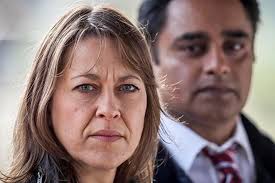
Rellik very cleverly subverted the way in which the detective story must follow a retrograde narrative path, starting with the crime and working backwards, by starting with the crime’s (apparent) resolution and working backwards and backwards, until in its final episode it leapt back to the beginning/end and a shocking dénoument. The structure took a bit of getting used to and never quite stopped being unsettling, but we thoroughly enjoyed the ride. It was produced by Harry and Jack Williams (The Missing) and featured, amongst other excellent performances, the wonderful Rosalind Eleazar as an early suspect.

Witnesses was the second series of the French crime drama starring Marie Dompnier. This one also stars Audrey Fleurot, who we know from Spiral, and whose return in that series we look forward to impatiently. Witnesses was compelling and baffling and ended most enigmatically (none the worse for that – I’d rather have honest to goodness open endings than ostensibly tidy endings that actually leave loose threads all over the place).

Fargo 3 brought us not one but two wonderful female cops. Gloria Burgle (Carrie Coon) and Winnie Lopez (Olivia Sandoval). And not one but two Ewan McGregors, as he plays twin brothers. One David Thewlis was more than enough, however – his villain was quite the most revolting, viscerally unpleasant character I’ve seen on screen for some time. That’s a compliment (I think) to the writing and the acting. Lord knows where this one is going next but we’ll be more than happy to go along. Fargo also introduced the wonderful phrase, ‘unfathomable pinhead-ery’ into our vocab, for which we are truly thankful.

Telly sci-fi had an altogether brilliant year.
Agents of Shield had an outstanding season with a multi-layered narrative that messed with our heads and our hearts. Beautifully played and written, and quite breathtaking.

Orphan Black reached its fifth and final season, having maintained its form throughout the four years that it has been running. The weight of the series is carried – seemingly effortlessly – by the awesome Tatiana Maslany, who plays not only various clone ‘sestras’ but at various times plays one of them masquerading as one of the others. It’s dazzlingly done. It also stars the rather wonderful Maria Doyle Kennedy as Mrs S.
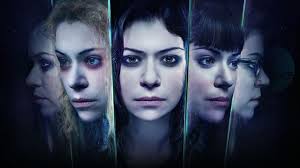
We’re not far through Star Trek: Discovery yet, but from episode 3 on were hooked. Yes, OK, that coincides with the arrival of Jason Isaacs, but it’s not just because Jason Isaacs. Sonequa Martin-Green is excellent, as is Anthony Rapp, and Mary Wiseman as cadet Tilly. It’s visually brilliant, and the plot is loaded with moral ambiguity from which it does not flinch. It promises much and we look forward to it developing further.
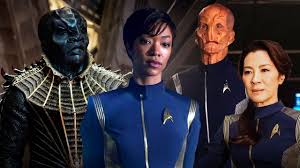
I remain loyal to The Walking Dead even though no one could claim that it’s unproblematic. The tone and pace are extremely uneven and it depends far too often on (a) plot armour, (b) magically inexhaustible ammo and (c) people who we know are capable of good judgement behaving with unfathomable pinheadery. Nonetheless, I cannot envisage giving up on it. I have to see how this plays out – and there are episodes which grip and compel and convince.
Possibly the only one of my top TV shows which features in the critics’ lists is The Handmaid’s Tale. I also read the book for the first time, as part of my 60 books in 60 days challenge. So much has been said about the series that I don’t feel I can add anything especially insightful – it was horrifying and terrifying and brilliantly done.

And of course there’s Doctor Who. I wrote about the (to me, brilliant) news that the next Doctor will be a woman. Nonetheless, much as I look forward to seeing what Jodie Whittaker brings to the role I will need to grieve first for Peter Capaldi’s doctor, who I have loved – and for Pearl Mackie who has been a wonderful companion. PC’s final series was excellent, and the finale was heart-stopping and moving.
“I’m not trying to win. I’m not doing this because I want to beat someone, because I hate someone, or because I want to blame someone. It’s not because it’s fun. God knows it’s not because it’s easy. It’s not even because it works because it hardly ever does. I do what I do because it’s right! Because it’s decent! And above all, it’s kind! It’s just that… Just kind. If I run away today, good people will die. If I stand and fight, some of them might live. Maybe not many, maybe not for long. Hey, you know, maybe there’s no point to any of this at all. But it’s the best I can do. So I’m going to do it. And I’m going to stand here doing it until it kills me. And you’re going to die too! Some day… And how will that be? Have you thought about it? What would you die for? Who I am is where I stand. Where I stand is where I fall.” — The Doctor
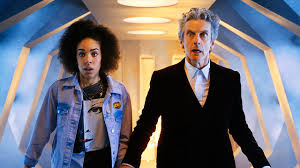

Three docs worth mentioning. Suzie Klein’s Tunes for Tyrants explored 20th century music in the context of Nazi and Stalinist oppression. She’s an excellent presenter and the material – and the music – was fascinating and powerful.

Bowie’s departure from this dimension was – for me amongst others – the greatest loss of 2016, a year of losses. Bowie – the Last Five Years brought us the final phase of that extraordinary story, as he worked on his last two albums, and the stage musical Lazarus. We were reminded, as if we could forget, not only of his talent, but of his humour and intelligence, his warmth and wit. And that last body of work is not only a worthy finale to his career but imbued with a sense of mortality and the fragility of life.

Neil Brand is one of my favourite music-explainers. Charles Hazlewood and Tom Service have got that nailed in terms of classical music but for the music of stage and screen, for the popular song, Neil is your man, and The Sound of Musicals was a delight.

We loved Poldark, and not just for the scenery.

The Replacement was a bit bonkers but both Vicky McClure (see also Line of Duty) and Morven Christie (also in The A Word, series 2 of which isn’t covered here only because it’s yet to be watched) were excellent.

And another favourite of mine, Suranne Jones, was magnificent in series 2 of Doctor Foster.

We got to see Jodie Whittaker pretending to be a doctor in Trust Me. Plot holes a-plenty (unless they’re just an indication of a second series coming up?) but well done, and well played by JW – looking forward to her being a real Doctor shortly.

Homeland was on excellent form, with the dynamics between Carrie and the new female PotUS adding a new dimension to the plot.

And Spin took us back into the shadowy world of French political manouevering.

It wasn’t all screen based culture. I made several visits to Leeds Grand Theatre for Opera North productions, some of which I reviewed for The Culture Vulture (see the Reviews page of this site, which also features my review of the Sheffield Crucible’s production of Julius Caesar). I also saw at Leeds Grand a magical production of Rimsky-Korsakov’s The Snow Maiden, at the Crucible, an intense Desire Under the Elms, and in the Crucible Studio various splendid Music in the Round chamber music concerts.
So, thanks to all who’ve shared these delights with me. Liz, Viv, Arthur, Ruth, Aid, Dad, and of course him that I’ve been watching telly and going to the pictures and going to gigs and plays with for >40 years…
So, where’s the plan?
Posted by cathannabel in Brexit, Politics on December 7, 2017
@Ed_Miliband What an absolutely ludicrous, incompetent, absurd, make it up as you go along, couldn’t run a piss up in a brewery bunch of jokers there are running the government at the most critical time in a generation for the country.
The government doesn’t know the economic impact of leaving the EU, and doesn’t want to know. Some of the leading Brexiteers do not even seem to care. That might prove the most damning assessment of all.
(Jonathan Lis, deputy director of think tank British Influence, which researches the impacts of Brexit)
No one who reads this, or knows me at all, will be unaware that I’m a Remainer. I voted for Britain to stay in the EU and nothing that has happened since has made me regret that at all.
I found it extraordinary and shameful that before the vote blatant lies were being presented as truths, that the electorate were being sold the highly improbable story that we could leave the EU, contribute nothing more to it, and have any of the benefits of membership that we happened to fancy.
I found it extraordinary and shameful that no one in Government appeared to have thought through what would happen if the vote went to Leave.
I find it shocking and alarming that those of us who voted to Remain are told daily that we ought to shut up because the Will of the People is that we leave the EU, and anyone with a dissenting view is a saboteur or a traitor.
I find it shocking and alarming that we have seen such an increase in racist harassment and assaults on our streets as ignorant xenophobes believe that they have been vindicated.
And I find it, frankly, embarrassing to witness the disarray, incompetence and lack of transparency in our negotiating ‘team’ and the obvious bafflement and disdain of competent politicians in the EU who are wondering how on earth the UK got itself into this mess.

So what happens now?
The truth is, I haven’t a clue. I have no faith in those at present heading up the Brexit process, not enough faith in the rebels within the government or (sadly) the Opposition to take a stand and refuse to allow them to lead us off the cliff edge. It seems to me that there are no truly good outcomes now, only marginally less awful ones.
I’m channelling W1A’s Tracy Pritchard these days…
I’m not being negative or anything, but this is only gonna get worse.
Can I just say, not being funny or anything, but I’ve got a feeling in my bottom about this and not in a nice way.
I’m pursuing two strategies to cope. Firstly, the sensible strategy. I’m reading the updated version of Ian Dunt’s splendid analysis of the situation:
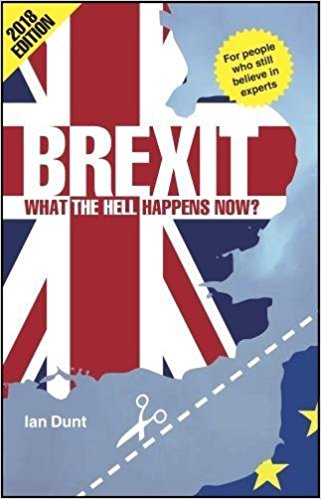
Your man Dunt knows his stuff, expresses it clearly and without bullshit, and if anyone can help me to understand trade agreements and the like, it’s him. None of this cheers me up. But on the whole I prefer to understand the shitstorm we’re heading into. The better we understand it now, the more chance that at some unspecified point in the future we can start to undo the damage.
On the other hand, there are times when kittens and otters are the only way to go.
You’re welcome.
Fascist Groove Thang
Posted by cathannabel in Politics, USA on December 3, 2017
As disconsolate as I was at the end of 2016 (and I was, deeply so), 2017 has managed, in some respects, to shock and depress me beyond expectations.

Shocked and depressed by the sight of giant swastika banners, and the sound of anti-semitic chants, on the streets of an American city, and the inability of the leader of the USA to unequivocally condemn fascist violence. Since Charlottesville, of course, that has been compounded by that leader acting as a publicist for the vile Britain First in their attempts to spread fear and hatred.
I know, of course, that fascism never went away, that there have always been cliques and cadres of unapologetic Nazis, but they used to deny what they were, to hide from publicity, not to court it. They used to put on their uniforms and get out their flags in private, amongst those of a like mind, not to parade them on the streets.
Not only are Nazis now out and proud, but the very notion of truth seems to be up for grabs. If you are caught out in an untruth, you simply claim it as an alternative fact.
Robert Spencer, a leading American Islamophobe who was banned from entering the UK in 2013 for his anti-Muslim history, posted on his website Jihad Watch that doubts about the veracity of the retweeted videos were beside the point. “The real question is not whether this or that video is accurate, but whether there is a problem with jihad terror and Islamic supremacism in Britain and elsewhere.”
https://www.theguardian.com/us-news/2017/nov/30/trump-twitter-far-right-racism-hate
“Whether it’s a real video, the threat is real,” Press Secretary Sarah Huckabee Sanders told reporters. “‘That is what the president is talking about, that is what the president is focused on dealing with, those real threats and those are real no matter how you look at it. His goal is to promote strong border security and strong national security.”
We were warned about this. Warned a long time ago.
Just as terror, even in its pre-total, merely tyrannical form ruins all relationships between men, so the self-compulsion of ideological thinking ruins all relationships with reality. The preparation has succeeded when people have lost contact with their fellow men as well as the reality around them; for together with these contacts, men lose the capacity of both experience and thought. The ideal subject of totalitarian rule is not the convinced Nazi or the convinced Communist, but people for whom the distinction between fact and fiction (i.e., the reality of experience) and the distinction between true and false (i.e., the standards of thought) no longer exist. (Hannah Arendt – The Origins of Totalitarianism, 1958)
Orwell, in his reflections on the Spanish Civil War, described his fear at the feeling that ‘the very concept of objective truth is fading out of the world’.
Nazi theory indeed specifically denies that such a thing as “the truth” exists. … The implied objective of this line of thought is a nightmare world in which the Leader, or some ruling clique, controls not only the future but the past. If the Leader says of such and such an event, “It never happened” – well, it never happened. If he says that two and two are five – well, two and two are five. This prospect frightens me much more than bombs. (George Orwell – ‘Looking Back on the Spanish War’, 1942)
Just over a year ago I was musing about Godwin’s law.
We’ve all cringed at the crass hyperbole of comparing some minor injustice – or even some pretty significant injustice – to the Holocaust. We’ve all sighed at the historical ignorance of many of those who make the comparisons, wondering what on earth they do teach them in schools these days.
And of course it’s right that we should check ourselves, as those comparisons spring to mind, to ensure that if we do invoke Hitler, Nazism, the Holocaust, the Warsaw Uprising or whatever it is, we do so mindful of the history, the scale, the world-altering significance and the uniqueness of those events.
But when we hear political rhetoric and recognise its echoes (whether the words are being used consciously or not), when we see tabloid headlines and recognise the way in which they are stoking and inciting hostility and prejudice, when proposals are made (firms having to gather data on ‘foreign’ workers, schools to gather data on the children they teach, registers of Muslims, etc) that remind us of the way in which the ground was prepared for fascism and genocide, of course we have to point this out.
What strikes me now, reading those words, is that we’re no longer just hearing echoes. Fascist rhetoric is being normalised. It’s perceived as being endorsed, even, when the President of the US refers to far-right protestors as ‘very fine people’, or retweets Britain First’s vile anti-Muslim videos. The wretched Farage is endorsing ‘concerns’ about the Jews, with a smooth segue from ‘the Israeli lobby’ to the ‘six million Jewish people living in America’, and the suggestion of disproportionate influence. Protocols of the Elders of Zion? Whether it’s a real document, the threat is real…
I’ve just finished reading Sinclair Lewis’s remarkable 1935 novel, It Can’t Happen Here.
As many have pointed out over the years, it’s not the greatest work of literature. And, of course, it’s not actually supernaturally prescient – Buzz Windrip resembles Trump in some ways, but there are many more differences. We are not now in the 1930s. Because we know what happened then, and what happened after, we cannot walk blindly into the kind of totalitarianism that Windrip delivers so easily, with so little resistance. We know – a diminishing few of us from first-hand experience, and many more from having read and learned from history – and we cannot unknow.
We can’t afford to be complacent though – few of us would have expected that we would be where we are today, that we would see and hear this normalisation of fascism. We have to draw upon what we know about what happened then, to ensure that it really, really can’t happen here, and now.
One criticism of Lewis’s novel which jars with me, however, is the notion that Doremus Jessup, its hero, is hard to root for.
Jessup, as his name suggests, was a deliberate throwback to the 19th century. He thinks and talks in very flowery stream-of-consciousness prose, stuffed with references to writers and concepts long forgotten. …. While Orwell’s hero Winston Smith attempts his doomed act of thoughtcrime rebellion against Big Brother from the very first page, Jessup takes an age to really stand up to his dictator. …
Doremus Jessup’s one act of rebellion, months after the dictatorship has been established, is to write a fiery front-page editorial. He is jailed for this, but they let him out when he promises to help his successor write pro-Windrip articles. Some hero.
By the end of the book, Jessup is an agent of the resistance based in Canada; his job is to skip across the border and stir up rebellion. But to achieve this, he spreads propaganda himself, telling each man the rumors he needs to hear.
This kind of behavior doesn’t make for a likable character. Indeed, Jessup’s constant wittering about his self-doubt and compromises make it surprisingly hard to root for him even when he’s in a concentration camp, being forced to drink castor oil and taking 20 lashes. (Whereas in Nineteen Eighty-Four, when Winston is tortured, we’re right there on the table with him.)
http://mashable.com/2017/02/15/dystopia-project-cant-happen-here/#PRGmT2s5wEq6
Clearly I am invested in Doremus Jessup because I found myself getting rather cross about this, on his behalf. The comparison with 1984 is, I think, largely spurious. We are from the start of that novel in the dystopian future where Big Brother reigns supreme. In It Can’t Happen Here we are in a modern democracy, where Buzz Windrip seems at first to be a hopeless candidate, a joke. Where the idea that a President might set up and mobilise a private army to root out dissidents, and set up concentration camps where those dissidents can be tortured and murdered, seems so improbable that no one is prepared for it.
Doremus isn’t an action hero. Perhaps that’s why I root for him, contrary to the Dystopia Project’s somewhat simplistic view. He’s not the guy you want by your side if it comes to a scrap. But he uses the things he is good at in the service of the Resistance, and uses the opportunity of continuing to work at the newspaper offices to establish an underground newspaper and distribute it through clandestine channels. He is caught with the text of an editorial exposing murders committed by one of Windrip’s Military Judges, and is brutally punished.
I was reminded of Francois Mauriac, the great French novelist, and member of the French Resistance during the Occupation. He wasn’t an obvious candidate for the resistance movement – he was naturally conservative, and indeed he initially supported Petain’s Vichy government. But Mauriac was someone who listened, always, to his conscience, and when the Vichy government began implementing anti-Semitic legislation, his conscience told him he had to act.

He too was a pretty weedy chap, but he wrote, and contributed to the production of clandestine texts such as Le Cahier noir (written under the pseudonym Forez, in 1943), which was a passionate condemnation of the Vichy regime and of collaboration with the Nazis and an equally passionate statement of hope, and of faith in humanity, of the ideals of justice and liberty.
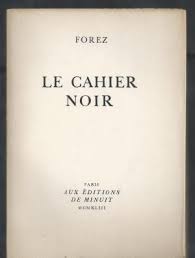
Mauriac was lucky, he managed to escape arrest by keeping on the move, but he knew what he was risking, and that he would have been unlikely to survive arrest, torture and a concentration camp. People like Mauriac, like Doremus, are as much heroes as those who take up arms.
I’m an utter physical coward. When I ask myself, as I have done so often when reading about the Nazi Occupation of France, what I would have done, I know I wouldn’t have been fighting in a partisan unit, blowing up railway lines or assassinating German officers in the Metro. But equally I believe I would not have been just keeping my head down and shutting up, and I know, absolutely without doubt that there are circumstances in which I would instinctively do the right thing even if it was dangerous, and absolutely without doubt that I would not betray or denounce. I like to think that I’d be with Mauriac and Jessup, writing the truth, getting it out there. That’s where our hopes must lie. That in Trump’s America and in Brexit Britain, in the European nations now flirting with fascism and infected with xenophobia, there will always be Mauriacs, always be Jessups, who just can’t sit still and do nothing.
We’re not facing those kind of decisions now, not yet at any rate. But smaller decisions may confront us at any time, even here, in a country where racist bigots have been emboldened by the decision to leave the EU and by the horrors inflicted by IS and their affiliates, to express their hatred in ways that we haven’t heard or seen for decades.
It can happen here. It’s on us to make sure it doesn’t.
So Doremus rode out, saluted by the meadow larks, and onward all day, to a hidden cabin in the Northern Woods, where quiet men awaited news of freedom.
And still Doremus goes on in the red sunrise, for Doremus Jessup can never die.
(Sinclair Lewis, It Can’t Happen Here)
https://www.brainpickings.org/2016/06/15/lying-in-politics-hannah-arendt/
https://www.theguardian.com/commentisfree/2017/dec/02/biggest-victories-trump-resistance
Hannah Arendt, The Origins of Totalitarianism, Meridian Books, 1958
Sinclair Lewis, It Can’t Happen Here, 1935, Penguin Modern Classics edition, 2017
George Orwell, ‘Looking Back on the Spanish War’, in George Orwell: Essays, Penguin Books, 2000



































